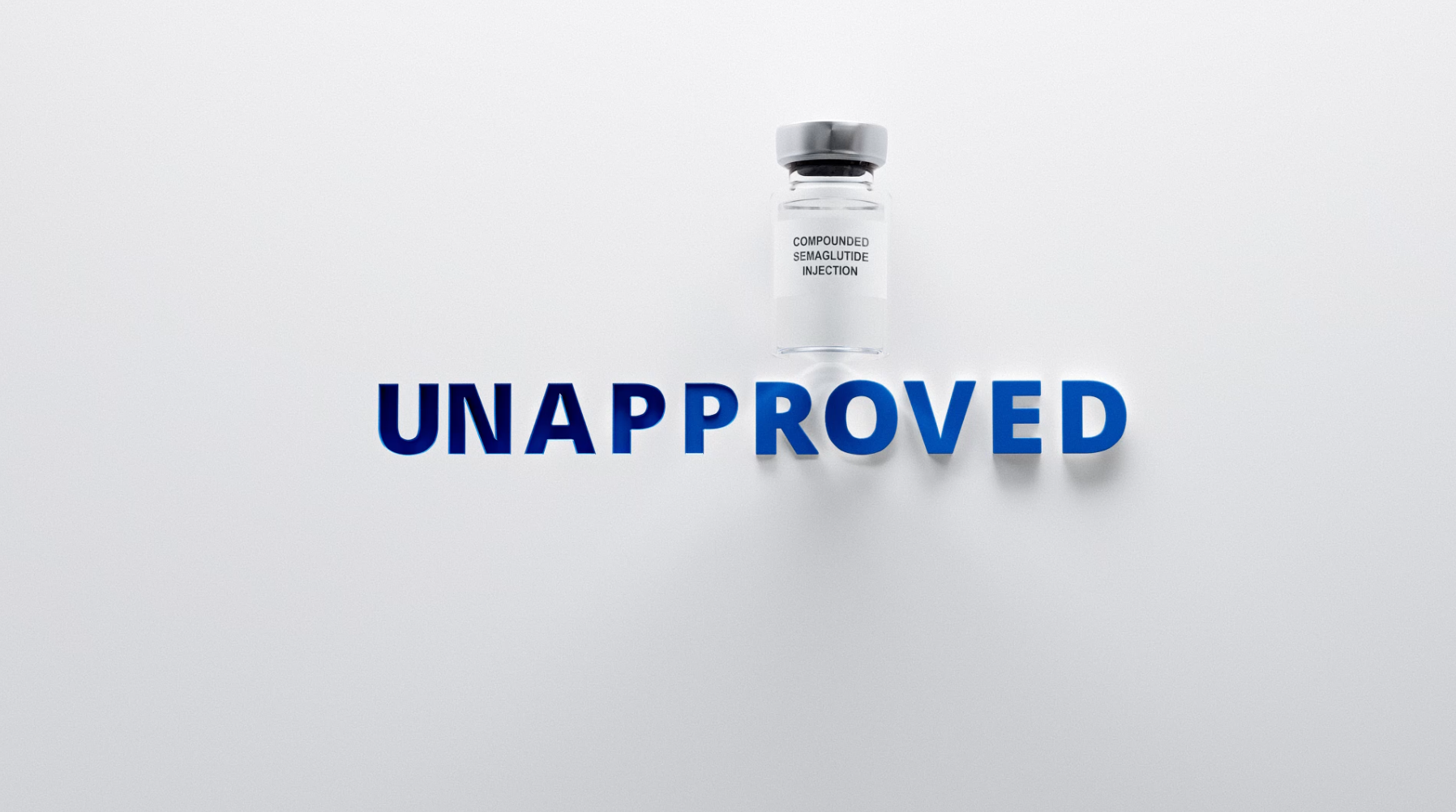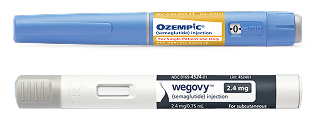Official communication about our medicines
containing semaglutide from Novo Nordisk
This site is intended for a US audience
Our promise
Learn about our promise and what we are doing to protect patient safety.


Video: Why the difference between real and knockoff semaglutide is so critical
Watch the video to learn more.
Please see Prescribing Information for Ozempic®.
Please see Prescribing Information for Wegovy®.
Article: Think you know the truth about compounded “semaglutide”?
Learn more about why knockoffs are risky, what FDA approval means, and what experts are saying to warn consumers.
Actor portrayals
Actor portrayal
Article: Counterfeit risks and tips to identify FDA-approved medicines containing semaglutide
Learn more about counterfeit products and how to identify authentic medicines containing semaglutide.
Video: Our commitment
We have been committed to making innovative medicines to treat serious chronic diseases like type 2 diabetes and obesity for more than a century.
Watch the video to learn more.

Actor portrayals
Article: Semaglutide frequently asked questions
Learn what semaglutide is and why it’s important to choose FDA-approved medicines. Understand that generic versions currently do not exist.
Read our perspectives

FDA-approved treatments exist and are fully available.
Novo Nordisk makes the only FDA-approved medicines containing semaglutide, which have been reviewed for safety, effectiveness, and quality. Find out more about them.
What is Wegovy®?
WEGOVY® (semaglutide) injection 2.4 mg is an injectable prescription medicine used with a reduced calorie diet and increased physical activity:
- to reduce the risk of major cardiovascular events such as death, heart attack, or stroke in adults with known heart disease and with either obesity or overweight.
- that may help adults and children aged 12 years and older with obesity, or some adults with overweight who also have weight-related medical problems, to help them lose excess body weight and keep the weight off.
Wegovy® contains semaglutide and should not be used with other semaglutide-containing products or other GLP-1 receptor agonist medicines.
It is not known if Wegovy® is safe and effective for use in children under 12 years of age.
Important Safety Information
What is the most important information I should know about Wegovy®?
Wegovy® may cause serious side effects, including:
- Possible thyroid tumors, including cancer. Tell your healthcare provider if you get a lump or swelling in your neck, hoarseness, trouble swallowing, or shortness of breath. These may be symptoms of thyroid cancer. In studies with rodents, Wegovy® and medicines that work like Wegovy® caused thyroid tumors, including thyroid cancer. It is not known if Wegovy® will cause thyroid tumors or a type of thyroid cancer called medullary thyroid carcinoma (MTC) in people
- Do not use Wegovy® if you or any of your family have ever had a type of thyroid cancer called medullary thyroid carcinoma (MTC) or if you have an endocrine system condition called Multiple Endocrine Neoplasia syndrome type 2 (MEN 2)
Do not use Wegovy® if:
- you or any of your family have ever had a type of thyroid cancer called medullary thyroid carcinoma (MTC) or if you have an endocrine system condition called Multiple Endocrine Neoplasia syndrome type 2 (MEN 2)
- you have had a serious allergic reaction to semaglutide or any of the ingredients in Wegovy®
Before using Wegovy®, tell your healthcare provider if you have any other medical conditions, including if you:
- have or have had problems with your pancreas or kidneys
- have type 2 diabetes and a history of diabetic retinopathy
- have or have had depression, suicidal thoughts, or mental health issues
- are scheduled to have surgery or other procedures that use anesthesia or deep sleepiness (deep sedation)
- are pregnant or plan to become pregnant. Wegovy® may harm your unborn baby. You should stop using Wegovy® 2 months before you plan to become pregnant
- are breastfeeding or plan to breastfeed. It is not known if Wegovy® passes into your breast milk
Tell your healthcare provider about all the medicines you take, including prescription and over-the-counter medicines, vitamins, and herbal supplements. Wegovy® may affect the way some medicines work and some medicines may affect the way Wegovy® works. Tell your healthcare provider if you are taking other medicines to treat diabetes, including sulfonylureas or insulin. Wegovy® slows stomach emptying and can affect medicines that need to pass through the stomach quickly.
What are the possible side effects of Wegovy®?
Wegovy® may cause serious side effects, including:
- inflammation of your pancreas (pancreatitis). Stop using Wegovy® and call your healthcare provider right away if you have severe pain in your stomach area (abdomen) that will not go away, with or without vomiting. You may feel the pain from your abdomen to your back
- gallbladder problems. Wegovy® may cause gallbladder problems, including gallstones. Some gallstones may need surgery. Call your healthcare provider if you have symptoms, such as pain in your upper stomach (abdomen), fever, yellowing of the skin or eyes (jaundice), or clay-colored stools
- increased risk of low blood sugar (hypoglycemia), especially those who also take medicines for diabetes such as insulin or sulfonylureas. This can be a serious side effect. Talk to your healthcare provider about how to recognize and treat low blood sugar and check your blood sugar before you start and while you take Wegovy®. Signs and symptoms of low blood sugar may include dizziness or light-headedness, blurred vision, anxiety, irritability or mood changes, sweating, slurred speech, hunger, confusion or drowsiness, shakiness, weakness, headache, fast heartbeat, or feeling jittery
- kidney problems (kidney failure). In people who have kidney problems, diarrhea, nausea, and vomiting may cause a loss of fluids (dehydration), which may cause kidney problems to get worse. It is important for you to drink fluids to help reduce your chance of dehydration
- severe stomach problems. Stomach problems, sometimes severe, have been reported in people who use Wegovy®. Tell your healthcare provider if you have stomach problems that are severe or will not go away.
- serious allergic reactions. Stop using Wegovy® and get medical help right away, if you have any symptoms of a serious allergic reaction, including swelling of your face, lips, tongue, or throat; problems breathing or swallowing; severe rash or itching; fainting or feeling dizzy; or very rapid heartbeat
- change in vision in people with type 2 diabetes. Tell your healthcare provider if you have changes in vision during treatment with Wegovy®
- increased heart rate. Wegovy® can increase your heart rate while you are at rest. Tell your healthcare provider if you feel your heart racing or pounding in your chest and it lasts for several minutes
- depression or thoughts of suicide. You should pay attention to any mental changes, especially sudden changes in your mood, behaviors, thoughts, or feelings. Call your healthcare provider right away if you have any mental changes that are new, worse, or worry you
- food or liquid getting into the lungs during surgery or other procedures that use anesthesia or deep sleepiness (deep sedation). Wegovy® may increase the chance of food getting into your lungs during surgery or other procedures. Tell all your healthcare providers that you are taking Wegovy® before you are scheduled to have surgery or other procedures
The most common side effects of Wegovy® may include: nausea, diarrhea, vomiting, constipation, stomach (abdomen) pain, headache, tiredness (fatigue), upset stomach, dizziness, feeling bloated, belching, low blood sugar in people with type 2 diabetes, gas, stomach flu, heartburn, and runny nose or sore throat.
Please see Prescribing Information and Medication Guide for Wegovy®.
Wegovy® is a prescription medication.
You are encouraged to report negative side effects of prescription drugs to the FDA. Visit www.fda.gov/medwatch, or call 1-800-FDA-1088.
What is Ozempic®?
Ozempic® (semaglutide) injection 0.5 mg, 1 mg, or 2 mg is an injectable prescription medicine used:
- along with diet and exercise to improve blood sugar (glucose) in adults with type 2 diabetes
- to reduce the risk of major cardiovascular events such as heart attack, stroke, or death in adults with type 2 diabetes with known heart disease
- to reduce the risk of kidney disease worsening, kidney failure (end-stage kidney disease), and death due to cardiovascular disease in adults with type 2 diabetes and chronic kidney disease
It is not known if Ozempic® is safe and effective for use in children.
Important Safety Information
Do not share your Ozempic® pen with other people, even if the needle has been changed. You may give other people a serious infection or get a serious infection from them.
What is the most important information I should know about Ozempic®?
Ozempic® may cause serious side effects, including:
- Possible thyroid tumors, including cancer. Tell your health care provider if you get a lump or swelling in your neck, hoarseness, trouble swallowing, or shortness of breath. These may be symptoms of thyroid cancer. In studies with rodents, Ozempic® and medicines that work like Ozempic® caused thyroid tumors, including thyroid cancer. It is not known if Ozempic® will cause thyroid tumors or a type of thyroid cancer called medullary thyroid carcinoma (MTC) in people
- Do not use Ozempic® if you or any of your family have ever had MTC, or if you have an endocrine system condition called Multiple Endocrine Neoplasia syndrome type 2 (MEN 2)
Do not use Ozempic® if:
- you or any of your family have ever had MTC or if you have MEN 2
- you are allergic to semaglutide or any of the ingredients in Ozempic®. See symptoms of serious allergic reaction in "What are the possible side effects of Ozempic®?"
Before using Ozempic®, tell your health care provider if you have any other medical conditions, including if you:
- have or have had problems with your pancreas
- have a history of diabetic retinopathy
- have severe problems with your stomach, such as slowed emptying of your stomach (gastroparesis) or problems with digesting food
- are scheduled to have surgery or other procedures that use anesthesia or deep sleepiness (deep sedation)
- are pregnant or breastfeeding or plan to become pregnant or breastfeed. It is not known if Ozempic® will harm your unborn baby or pass into your breast milk. You should stop using Ozempic® at least 2 months before you plan to become pregnant
Tell your health care provider about all the medicines you take, including prescription and over-the-counter medicines, vitamins, herbal supplements, and other medicines to treat diabetes, including insulin or sulfonylureas.
What are the possible side effects of Ozempic®?
Ozempic® may cause serious side effects, including:
- inflammation of your pancreas (pancreatitis). Stop using Ozempic® and call your health care provider right away if you have severe pain in your stomach area (abdomen) that will not go away, with or without vomiting. You may feel the pain from your abdomen to your back
- changes in vision. Tell your health care provider if you have changes in vision during treatment with Ozempic®
- low blood sugar (hypoglycemia). Your risk for getting low blood sugar may be higher if you use Ozempic® with another medicine that can cause low blood sugar, such as a sulfonylurea or insulin. Signs and symptoms of low blood sugar may include: dizziness or lightheadedness, blurred vision, anxiety, irritability or mood changes, sweating, slurred speech, hunger, confusion or drowsiness, shakiness, weakness, headache, fast heartbeat, and feeling jittery
- dehydration leading to kidney problems. Diarrhea, nausea, and vomiting may cause a loss of fluids (dehydration), which may cause kidney problems. It is important for you to drink fluids to help reduce your chance of dehydration. Tell your health care provider right away if you have nausea, vomiting, or diarrhea that does not go away
- severe stomach problems. Stomach problems, sometimes severe, have been reported in people who use Ozempic®. Tell your health care provider if you have stomach problems that are severe or will not go away
- serious allergic reactions. Stop using Ozempic® and get medical help right away if you have any symptoms of a serious allergic reaction, including swelling of your face, lips, tongue, or throat; problems breathing or swallowing; severe rash or itching; fainting or feeling dizzy; or very rapid heartbeat
- gallbladder problems. Gallbladder problems have happened in some people who take Ozempic®. Tell your health care provider right away if you get symptoms which may include: pain in your upper stomach (abdomen), fever, yellowing of the skin or eyes (jaundice), or clay-colored stools
- food or liquid getting into the lungs during surgery or other procedures that use anesthesia or deep sleepiness (deep sedation). Ozempic® may increase the chance of food getting into your lungs during surgery or other procedures. Tell all your health care providers that you are taking Ozempic® before you are scheduled to have surgery or other procedures
The most common side effects of Ozempic® may include nausea, vomiting, diarrhea, stomach (abdominal) pain, and constipation.
Please see Prescribing Information and Medication Guide for Ozempic®.
Ozempic® is a prescription medication.
Novo Nordisk provides patient assistance for those who qualify. Please call 1-866-310-7549 to learn more about Novo Nordisk assistance programs.
You are encouraged to report negative side effects of prescription drugs to the FDA. Visit www.fda.gov/medwatch or call 1-800-FDA-1088.
What is RYBELSUS®?
RYBELSUS® (semaglutide) tablets 7 mg or 14 mg is a prescription medicine used along with diet and exercise to improve blood sugar (glucose) in adults with type 2 diabetes.
- RYBELSUS® is not for use in people with type 1 diabetes
- It is not known if RYBELSUS® is safe and effective for use in children
Important Safety Information
What is the most important information I should know about RYBELSUS®?
RYBELSUS® may cause serious side effects, including:
- Possible thyroid tumors, including cancer. Tell your healthcare provider if you get a lump or swelling in your neck, hoarseness, trouble swallowing, or shortness of breath. These may be symptoms of thyroid cancer. In studies with rodents, RYBELSUS® and medicines that work like RYBELSUS® caused thyroid tumors, including thyroid cancer. It is not known if RYBELSUS® will cause thyroid tumors or a type of thyroid cancer called medullary thyroid carcinoma (MTC) in people
Do not use RYBELSUS® if:
- you or any of your family have ever had MTC, or if you have an endocrine system condition called Multiple Endocrine Neoplasia syndrome type 2 (MEN 2)
- you have had a serious allergic reaction to semaglutide or any of the ingredients in RYBELSUS®. See symptoms of serious allergic reaction in “What are the possible side effects of RYBELSUS®?"
Before using RYBELSUS®, tell your healthcare provider if you have any other medical conditions, including if you:
- have or have had problems with your pancreas or kidneys
- have a history of vision problems related to your diabetes
- are scheduled to have surgery or other procedures that use anesthesia or deep sleepiness (deep sedation)
- are pregnant or plan to become pregnant. It is not known if RYBELSUS® will harm your unborn baby. You should stop using RYBELSUS® 2 months before you plan to become pregnant
- are breastfeeding or plan to breastfeed. Breastfeeding is not recommended during treatment with RYBELSUS®
Tell your healthcare provider about all the medicines you take, including prescription and over-the-counter medicines, vitamins, and herbal supplements. RYBELSUS® may affect the way some medicines work and some medicines may affect the way RYBELSUS® works.
How should I take RYBELSUS®?
- Take RYBELSUS® exactly as your healthcare provider tells you to
- Do not take more than 1 tablet each day
- Take RYBELSUS® by mouth on an empty stomach in the morning with a sip of plain water (no more than 4 ounces). Do not take RYBELSUS® with any other liquids besides water
- Do not split, crush, or chew. Swallow RYBELSUS® whole
- After 30 minutes, you can eat, drink, or take other oral medicines
- If you miss a dose of RYBELSUS®, skip the missed dose and go back to your regular schedule
What are the possible side effects of RYBELSUS®?
RYBELSUS® may cause serious side effects, including:
- inflammation of your pancreas (pancreatitis). Stop using RYBELSUS® and call your healthcare provider right away if you have severe pain in your stomach area (abdomen) that will not go away, with or without vomiting. You may feel the pain from your abdomen to your back
- changes in vision. Tell your healthcare provider if you have changes in vision during treatment with RYBELSUS®
- low blood sugar (hypoglycemia). Your risk for getting low blood sugar may be higher if you use RYBELSUS® with another medicine that can cause low blood sugar, such as a sulfonylurea or insulin. Signs and symptoms of low blood sugar may include: dizziness or lightheadedness, blurred vision, anxiety, irritability or mood changes, sweating, slurred speech, hunger, confusion or drowsiness, shakiness, weakness, headache, fast heartbeat, and feeling jittery
- kidney problems (kidney failure). In people who have kidney problems, diarrhea, nausea, and vomiting may cause a loss of fluids (dehydration), which may cause kidney problems to get worse. It is important for you to drink fluids to help reduce your chance of dehydration
- severe stomach problems. Stomach problems, sometimes severe, have been reported in people who use RYBELSUS®. Tell your healthcare provider if you have stomach problems that are severe or will not go away
- serious allergic reactions. Stop using RYBELSUS® and get medical help right away, if you have any symptoms of a serious allergic reaction, including swelling of your face, lips, tongue, or throat; problems breathing or swallowing; severe rash or itching; fainting or feeling dizzy; or very rapid heartbeat
- gallbladder problems. Gallbladder problems have happened in some people who take RYBELSUS®. Tell your healthcare provider right away if you get symptoms of gallbladder problems, which may include: pain in your upper stomach (abdomen), yellowing of skin or eyes (jaundice), fever, and clay-colored stools
- food or liquid getting into the lungs during surgery or other procedures that use anesthesia or deep sleepiness (deep sedation). RYBELSUS® may increase the chance of food getting into your lungs during surgery or other procedures. Tell all your healthcare providers that you are taking RYBELSUS® before you are scheduled to have surgery or other procedures.
The most common side effects of RYBELSUS® may include nausea, stomach (abdominal) pain, diarrhea, decreased appetite, vomiting, and constipation. Nausea, vomiting, and diarrhea are most common when you first start RYBELSUS®.
Please see Prescribing Information and Medication Guide for RYBELSUS®.
RYBELSUS® is a prescription medication.
You are encouraged to report negative side effects of prescription drugs to the FDA. Visit www.fda.gov/medwatch or call 1-800-FDA-1088.

